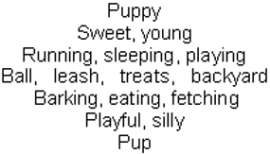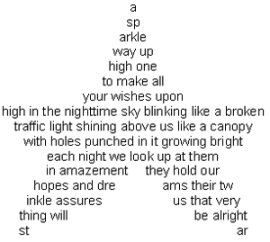
Published by K12 Handhelds, Inc.
Portal, AZ
www.k12handhelds.com
Copyright © 2007 by K12 Handhelds, Inc. License CC-by, 
This work is licensed under a Creative Commons Attribution 3.0 United States License.
Developed in conjunction with Wicomico County Schools.
Table of Contents
- Introduction
- Types of Poetry
- Alphabet
- Cinquain
- Diamante
- Definition
- Catalog
- Acrostic
- Limerick
- Quatrain
- Haiku
- Concrete
- Poems for Two Voices
- Activities
- Glossary
Introduction
Poetry is a special kind of writing that uses the sound and rhythm of words to tell a story and to make the reader feel a certain way. These feelings are created through setting, mood, and tone. Setting is the time and place a story or poem takes place in. Mood and tone have to do with how the poem makes you feel. It could be a funny, silly poem or a dark, sad one.
Sometimes, poems rhyme, but sometimes they don’t. Sometimes, poems follow specific rules, like how many words are in each line, but not always. Some poems have several stanzas or sections, and other don't. Some poems have a specific number of syllables in each line, but some poems have no rules at all.
One of the best things about poetry is that there are so many kinds of poems. You can choose the type that works best for what you are writing about and how you feel. You can even create your own kind of poem.
Types of Poetry
Here are some different types of poems with examples of each one.
Alphabet
Alphabet poems have 26 lines, each beginning with a different letter of the alphabet. They are written about one theme. Sometimes they rhyme, but they don’t have to.
Here is an example of an alphabet poem:
Airplanes, airplanes go
Back and forth
Covering the landscape of our
Dear planet
Earth
Flying high above the
Ground to soaring new
Heights
In all types of weather
Just perfect or a
Kind of cloudy night
Lifting its wings
Moving through the air
Nice and peaceful
Over our heads
Pilots bring us
Quickly to our destinations
Rome, Japan, and other
Special places
Traveling is my
Ultimate favorite activity
Vanishing off to a new place
Wishing I could fly every day
X marks the spot I will go
Yelling with excitement
Zipping across the country
Cinquain
A cinquain is a five-line poem (like “cinco” for five in Spanish). The first line is one word, usually a noun, which is the main subject of the poem. The second line contains two adjectives that describe the topic. The third line has three verbs that relate to the topic. The fourth line has four words that can be a phrase or sentence telling something about the topic. The fifth line is a single word that is another word for the topic.
Here is an example of a cinquain:
Clowns
Silly, Funny
Running, jumping, laughing
They make the circus so much fun
Performers
Diamante
A diamante is similar to a cinquain, but it has seven lines. Diamante poems have the shape of a diamond. The first line is one noun. The second line is two adjectives. The third line has three participles (-ing verbs). The fourth line has four nouns. Then the pattern repeats the opposite direction. The fifth line has three participles (-ing verbs). The sixth line has two adjectives. The seventh line has one noun.
Here is a diamante poem:

Definition
A definition poem defines something using metaphors or imagery. This is special language that paints a picture for the reader. It is much more interesting than a regular dictionary definition. Definition poems generally use free verse (which means that they have no regular rules for rhythm or meter).
Here is an example of a definition poem:
Dancing is beautiful movement
Dancing is freedom
It is a means of self-expression
Dance brings out our emotions
Dance is a form of communication
It allows your heart to speak
Dancing is poetry in motion
Dancing is free
Dancing is my life
Catalog
A catalog poem is a list of things. It can be any length and may rhyme or not.
Here is an example of a catalog poem about spring:
Spring
Snow melting
Air warming
Trees coming to life
Flowers budding
Birds singing
Baseball season starting
Everything turning green
My favorite time of year
Acrostic
An acrostic poem is a poem that is written around a word. The first letter of each line spells out that word.
Here is an acrostic poem:
Buddies for life
Every day
Staying up late
Talking on the phone for hours
Forever pals
Rarely separated
I am here for you for
Even when things are tough
No matter what happens
Dear friends we will remain
Siblings in spirit
Limerick
A limerick is a silly or humorous poem that follows a specific pattern. Lines 1, 2, and 5 are longer and rhyme with each other. Lines 3 and 4 are shorter and rhyme with each other.
Here is an example of a limerick:
There once was a clown named Bo
Who liked to put on a great show
He drove a small car
And he was a star
He did tricks that made us say “Oh!”
Quatrain
A quatrain is a four-line poem that rhymes. (“Quatro” means four in Spanish.) Each line is about the same length. The rhyming pattern may be that lines 1 and 2 rhyme and lines 3 and 4 rhyme. Or lines 1 and 3 and lines 2 and 4 may rhyme.
Here is a sample quatrain:
Swimming is a lot of fun
Hanging out all day in the sun
Splashing around in the pool
It’s the best way to stay cool
Haiku
Haiku poetry comes from Japan. Haiku poems have three lines. They follow very specific rules. The first line has five syllables, the second line has seven syllables, and the third line has five syllables. Haiku poems do not rhyme. Often, the topic is related to nature or the seasons.
Haiku example:
Autumn leaves falling
Turning shades of red and brown
Seasons are changing
Concrete
A concrete poem is written in the actual shape of the subject of the poem.
Here is a concrete poem. You can tell what it is about without even reading it!

Poems for Two Voices
A poem for two voices is written for two people to perform. Often, it is written in two columns with each person’s part in a column.
Here is a poem for two voices. Try reading it aloud with someone.
I love it when it rains
I can’t say the same
The raindrops and puddles,
such a wonder
What’s so great about
dark clouds and thunder
Splashing about,
wearing raingear
Watching the lightening,
hiding in fear
I love to run around
and get all wet
I stay in doors and read a book
You should go really
go outside and play
I’m content in my room;
that’s where I’ll stay
Activities
Here are some activities to try on your own.
Choose two types of poems and compare and contrast them. How are they similar? How are they different? Which do you like better? Why?
For each of the following topics, which type of poem might be most appropriate?
A flower
A funny story
A list of reasons you love to play baseball
A discussion about what the best flavor of ice cream is
3. Choose a type of poem and write your own poem in that format.
Glossary
accent pattern – the way in which certain words or syllables are stressed or said more loudly or emphatically
acrostic poem – a poem that is written around a word, usually the topic of the poem, such that the first letter of each line spells out that word
alliteration – the repetition of the first letter in several words used to give writing a poetic sound; example: The cat was slinking along in its slim, sleek manner
alphabet poem – has 26 lines, each beginning with a different letter of the alphabet
catalog poem – a poem that consists of a list or itemization of things or events
cinquain – a poem that has five lines and follows specific rules including that the first line be one word that is the topic of the poem, the second lines has two adjectives, the third line has three verbs, the fourth line has four words that are a sentence or phrase, and the fifth line has a single word that sums up the poem
concrete poem – a poem that is written in the physical shape of the subject.
definition poem – a free verse poem that uses imagery to define something
diamante – a poem that has seven lines as follows: line 1 has one noun, line 2 has two adjectives, line 3 has three participles, line 4 has four nouns, line 5 has three participles, line 6 has two adjectives, and line 7 has one noun
figurative language – using metaphors and other words to mean more than their literal meaning
free verse – poetry that has no regular rhythm or meter
haiku – an unrhymed poem that has three lines with 5, 7, and 5 syllables each; this type of poetry comes from Japan and the topic often relates to nature
imagery – the use of figurative language to paint a vivid picture
limerick – a humorous poem that has five lines, with lines 1, 2, and 5 have three feet (units of verse) and rhyme, and lines 3 and 4 have two feet and rhyme
metaphor – a figure of speech that states two unlike things are the same in a figurative way (without using “like” or “as”); example: She was the wind.
mood – emotions; feelings
onomatopoeia – the use of words that imitate or suggest a sound; example: hiss, buzz
personification – a description of something that is not a person as though it were a person; example: The stream made a happy, singing sound through the forest.
quatrain – a four-line verse or poem that rhymes
rhyme – words that end in the same sound but have a different beginning sound; examples: cat/hat, toy/joy
rhythm – tempo or beat
setting – the time and place in which a story takes place
simile – a figure of speech comparing two unlike things using “like” or “as”; example: She was as fast as the wind.
stanza – a section of a poem with lines grouped together
tone – mood; quality or manner of expression